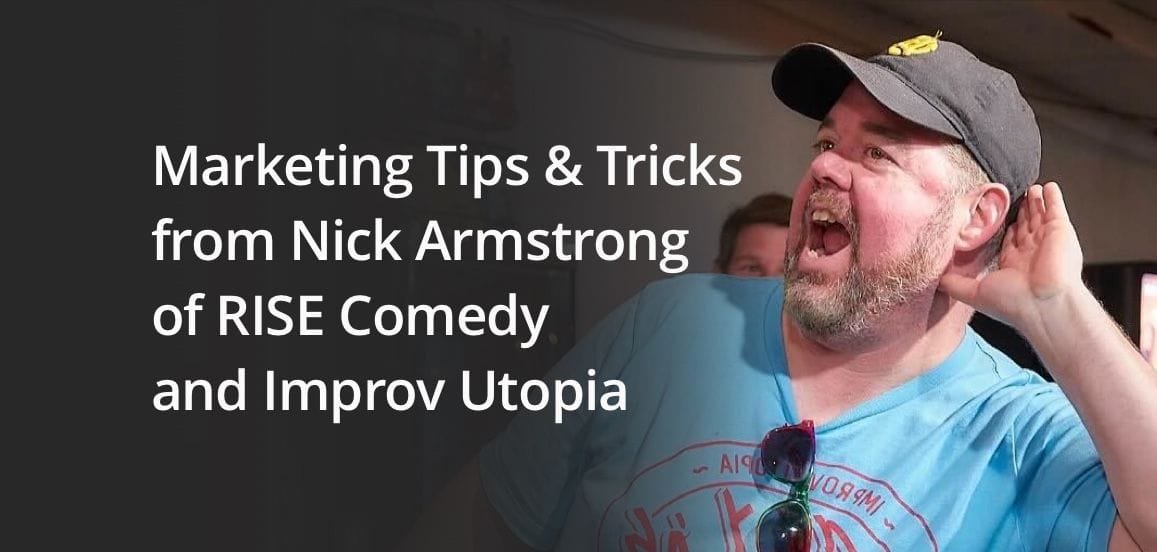Building a Successful Comedy Theater: Marketing Tips & Tricks from Nick Armstrong of RISE Comedy and Improv Utopia

When Nick Armstrong first started in the comedy world, he quickly realized that running a successful theater is about far more than just being funny. It's a delicate balance of artistic passion and strategic business thinking—a lesson he learned through years of experience with Improv Utopia, Westside Comedy Theater and RISE Comedy.
The Heart of Comedy: It's Not About the Money
Contrary to popular belief, opening a comedy theater isn't a get-rich-quick scheme. Armstrong is brutally honest about this: "If you want to make money in this industry, sure, you can—but that shouldn't be your focus."
The comedy world is fundamentally about community and art.
But art alone doesn't keep the lights on. Successful comedy theaters understand that behind every spontaneous laugh is a carefully crafted business strategy.
Finding Your Comedy Niche
Imagine opening a stand-up comedy theater in a city already saturated with comedy clubs. That's a recipe for disaster. Armstrong learned this firsthand while working in Denver, a city overflowing with stand-up shows and venues. The key is finding your unique space in the market. It would be harder to sell a stand up show on Friday and Saturday in Denver due to oversaturation of over 15 or more shows a night at breweries, bars, you name it. Not saying don’t have it, but it can’t be like the others.
This means asking tough questions: What type of comedy does your community need? Are there gaps in the current comedy landscape? Your theater shouldn't just replicate what already exists—it should complement and expand the local comedy ecosystem.
For Armstong, it meant not focusing on stand-up, but instead on improv, sketch, acting and more.
Marketing Begins On Site
Here's a surprising insight from Armstrong's marketing background: Your marketing begins the moment someone approaches your theater.
Think of it like a dental office—a place people typically fear.
“Walk into a dental office. People fear dentists, right?” he asks. “Well people fear comedians.”
We’ve all seen audiences which shy away from sitting in the front row.
So how do you make it inviting?
Take a hint from dental offices by thinking about the details:
- Paint your space in a way that creates warmth and creativity
- Ensure the space smells pleasant - something too many theaters overlook
- Create welcoming visual elements
As an example of the last point, Armstrong says this: “We have a potato guy on our front that says ‘I’m the potato guy and I’m the positive potato.’ And everybody always makes a comment about how cute it is. So just simple things.”
These might seem trivial, but they transform a potential audience member's perception from apprehension to excitement.
The Digital Comedy Landscape
Social media isn't just a marketing tool—it's your lifeline to potential audiences. But Armstrong warns against a one-size-fits-all approach. Different platforms serve different demographics:
- Facebook attracts the 25-44 age range
- TikTok is your gateway to younger audiences
- FB Group sites are becoming increasingly inactive
And don't just post randomly— Armstrong reminds us to create a strategic content calendar that keeps audiences engaged.
“You can go and make a calendar where you can put in… like a whole two, three weeks worth of content. Do it in one day; it takes a couple hours and then it’s just automatically going.”
Pro tip: Allocate about 7-8% of your gross revenue to marketing. This is the standard, but be strategic about how you spend it and if you don’t have that much there are free things you can do.
Beyond the Laugh: Building a Community
The most successful comedy theaters understand they're not just selling shows—they're creating experiences. Your audience should feel welcomed, understood, and eager to return. This means:
- All staff acting professionally at all times
- Providing clear information about shows
- Performers are portrayed well with professional photography & digital posters
- Making every interaction as simple and enjoyable as possible
The Continuous Learning Curve
Comedy, like any art form, is constantly evolving. Armstrong's biggest advice? Stay adaptable. Research social media trends, understand your audience's changing preferences, and never become complacent.
Conclusion
Running a comedy theater is a passionate endeavor. It's about giving back to a community that has given you so much. As Armstrong eloquently puts it, "You want to give that positive experience... You want them to walk in again and again."
Whether you're an aspiring comedy theater owner or a performer looking to understand the business side, remember: Success comes from a perfect blend of artistic integrity and letting people know who you are and why you exist.
Resources:



